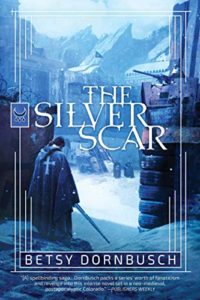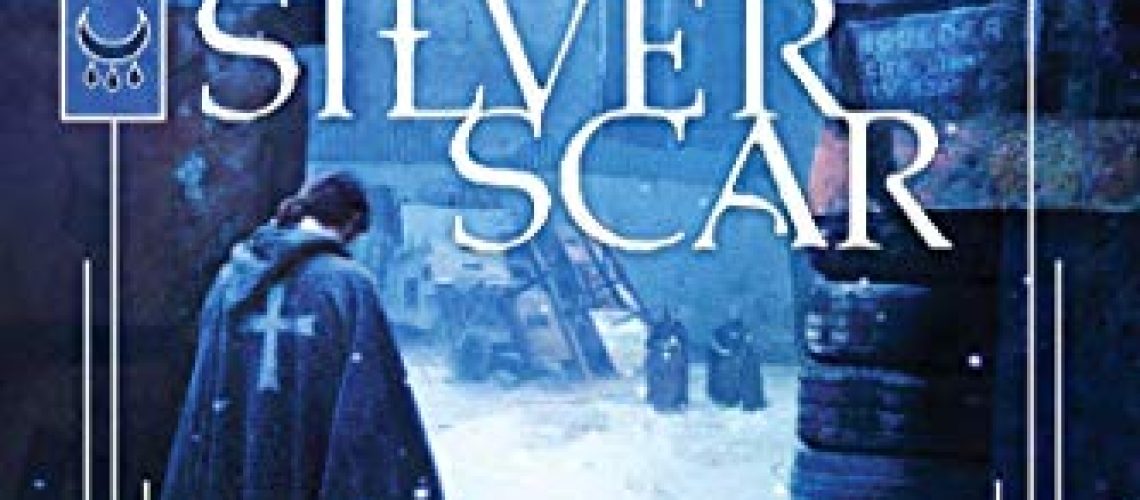Betsy Dornbusch’s The Silver Scar distills her epic fantasy skills into a potent single-volume epic set in a post-apocalypse Colorado.
Post-Apocalypse Colorado is a hell of a place. There are Wiccans and Indigos in the mountains, some of whom still engage in eco terrorism. The communities of Denver and Boulder, fortress cities in this fallen age, are bastions of a Christianity that has gained its taste for crusade against the benighted people around. There are slavers who come up from wealthy and powerful Mexico, an additional complication for whose would trade and travel in this fallen world. Technology has somewhat fallen—bullets are expensive, so medieval weaponry and armor are much easier to make. Horses are as common as solar powered motorcycles and trucks (drays).

And in the midst of the church plotting a crusade is a orphaned Wiccan turned archwarden of the Church, whose abilities and loyalties threaten to upset the balance of power in the front range, and perhaps more. His name is Trinidad, and he has no idea himself of how far he can go, will go or will need to go as forces unleashed around him propel him into conflict.
This and much more is in Betsy Dornbusch’s The Silver Scar.
The novel felt right away very much in the style, theme, and character of a Betsy Dornbusch novel, so much so that although it was a new character, new setting and a new premise, the novel had an easy familiarity of recognition that allowed me to dive into the novel immediately. Trinidad is thrown right into the deep end, as is the reader. The author trusts the reader to follow the main character as he is put into conflict and a pointed situation. It is in the exploration of that situation, and the mess that the main character has gotten into, that we get the worldbuilding, the character development and the illumination of the world. In an interview, I once told the author that she seemed to like to put her characters through hell right from the get go, a charge that Dornbusch pleaded to. And in The Silver Scar, we see that with Trinidad. From early on, he does all he can to avoid the latest setback and catastrophe. Dornbusch’s heroes are survivors of bad fortune, by being able to, with help, outlast it. Trinidad falls into that tradition.
In addition to that, we get thorny, prickly relationships centered around the main character. The author delights in setting up a relationship map that puts Trinidad into multiple overlapping worlds and spheres, often hostile to each other. Trinidad has to navigate relationships, friendships, rivalries, and hatreds that intersect and come together all around him. This novel is driven by, and the turns of plot and revelation all come from, these relationships. The novel thrives not on external threats and big bads, but these evolving character interactions instead. Even in the relationships not directly touching Trinidad, like, for example, between Reine and Javelot, there is a care and craft to how the author works and develops characters and how they function with each other.
The center of these interactions, of course, is Trinidad himself. We get to see him from multiple angles and perspectives, both external and internal, seeing where he came from, and why he is in the end so important to everyone. His desire to do what’s right leads him down many paths, provides lots of internal as well as external conflict, and provides a rich stew for drama when the conflicting worlds and characters force him to make hard choices. I felt for him as he learned some truths about his past with some characters that illuminated and brought things going forward, but also put him in yet more difficult situations to navigate, new aspects of relationships to try and work. In that vein, Trinidad’s same-sex relationship with Castile is a well portrayed driver of both their characters and the world around them. It’s not the main thrust of the novel and what happens, but it is important, an essential part of their characters and motivations.
The novel is fantasy, but there are not many fantastic elements in the novel. The existence of roving, that is, the ability to dreamwalk, and the silver sands of a prized location only reachable by that power are the only fantastic elements in the novel. Without them, this would be, and for the most part therefore is, a straight up post-apocalyptic novel about this society and these characters. The author is far more interested in that relationship web and how it all plays out than a more conventional fantasy story with lots of supernatural or magical elements to play out.
The novel is sharp, strong and often brutal in its depiction of life in this future Colorado, and it is that which gets the attention and care. Dornbusch is willing to explore dark themes and ideas in opposition as she looks at what her post-apocalypse Colorado is like, and what people are willing to do for and to maintain power and authority. There are acts of darkness, hatred and prejudice, and it is acts of heroism and self sacrifice and standing for what’s right that the author shows is the way to combat those forces. These conflicts, however, never come without a sometimes painful personal and societal cost, and the novel shows that, too. Time and again, Trinidad, Castile and other characters are forced to make hard decisions and sacrifice for what they believe and want. There are losses and characters do die, sometimes suddenly and without warning. This is not an easy world to live in.
The novel does feel more compressed than her Seven Eyes Trilogy. The Silver Scar is a lean and mean 400-page novel that tells a complete, epic story. There really isn’t obvious sequel material (although the story ends, messily and realistically, but with the main thrust and conflicts finished), and so the story is nicely self contained. In an age of series and ever sprawling stories, the author has cultivated an epic tale and contained it within a single volume. This does mean, as noted above, that there is thriller-like pacing to this novel, and once the plot gets going, which is early in the novel, there is little fat and lots to get the pages turning.
The Silver Scar distills what is good and excellent about Dornbusch’s writing into a single volume, filling the reader with a vision of a post-apocalyptic world, and a strong central character for the reader to identify with and follow as he is put through the wringer, trying to do right and trying to do right by those he cares about. I think it’s the best novel she has written yet, and I look forward to where her imagination takes her next.







